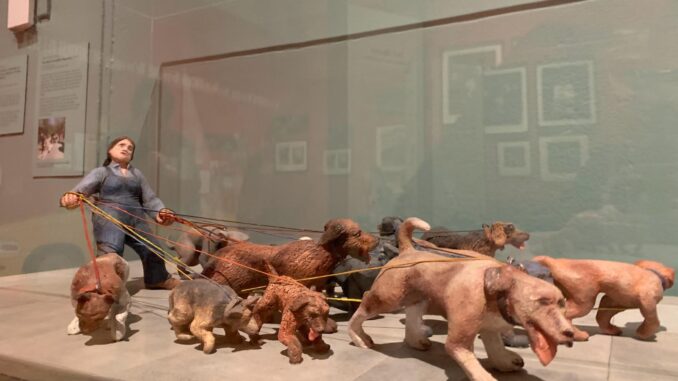
BY KELLY MCGRATH
Sustenance, warmth, protection,survival. Animals have been woven into the fabric of human society as invaluable resources for thousands of years. But somewhere along the way they became more: family. The New-York Historical Society is honoring that bond, and the history of pets in New York City, in a new exhibition that opened to the public last Friday.
The exhibit features the important roles that pets have played, from the times of Native Americans and the earliest European settlers to present day, with the exhibition, Pets and The City, which will remain open until April.
It includes photographs, paintings, and historical artifacts drawn largely from the Museum and Library’s own collections and archives that showcase the special relationship between man and animal spanning over 250 years.
Silver-inscribed dog collars over a century old are displayed alongside hand-knitted sweaters for dogs in the 21st century. The juxtaposition of artifacts old and new highlights that the love between man and his furry companion is one that has endured the test of time and evolves with our changing society.
Visitors will get an opportunity to learn about four-legged heroes in history, like Sergeant Stubby, a Boston Terrier who bravely served in World War I, saving soldiers from gas attacks, seeking out the wounded. Stubby was even credited with nabbing a German spy by his pants. The exhibition also honors the 300 dogs and their handlers who sacrificed their safety, health and happiness as search and rescue teams after the 9/11 attacks.
“New York City residents have always loved their pets, and this exhibition reveals the important role that pets have played throughout the city’s history, beyond providing companionship to their owners,” said president and chief executive officer of the New-York Historical Society, Louise Mirrer. “I hope visitors come away from this exhibition with a deeper appreciation for the profound impacts pets have had on our city’s culture and society and a more nuanced understanding of the complexities of our animals.”
The exhibit’s curator, Roberta J.M Olson, set out to examine the broader social context of New York’s pet population including adoption, the trafficking of exotic animals, animal rights laws, and the role animals play not just as pets but as valued members of the workforce.
“In New York City alone, it is estimated there are more than two million animal companions who reign over human hearts, homes, and pocket books,” Olson said in her opening remarks at the exhibition’s opening. “Given that, it’s fascinating to explore how these creatures rose to such a place of distinction. From the origins of pets among Indigenous people to today’s doggy daycares and cat cafés, this exhibition offers a visual journey through the evolving relationship between Gotham’s people and its animals . . . . City dwellers’ relationships with animals and pets illuminate humanity’s relationship with nature and are the bellwether of our shared future and the fate of our planet.”
The exhibition comes at a time of extreme political strife worldwide. The Global Peace Index shows that in 2024 there are 92 countries involved in 56 conflicts. This is the highest number of global conflicts since World War II. As bloody wars are being waged overseas and election day creeps ever closer, division amongst neighbors grows.
Olson hopes that Pets in the City will remind people that the bond between man and animal transcends language, politics and nationality. The way that we care for and love our animals comes from the most primal and basic depths of our humanity.
At the exhibition’s opening one reporter commented that in a time of so much global injustice and human suffering, an exhibition dedicated to pets seems inconsequential. But Olson disagreed. “I think it’s a great relief right now.” she said. “It takes us to issues that, I think, are extremely important beyond all the noise and the horror of the world today.”
Olson urged skeptics to consider a quote from Henry Bergh, the founder of the American Society for the Prevention of Cruelty to Animals: “Men will be just to men when they are kind to animals.”
